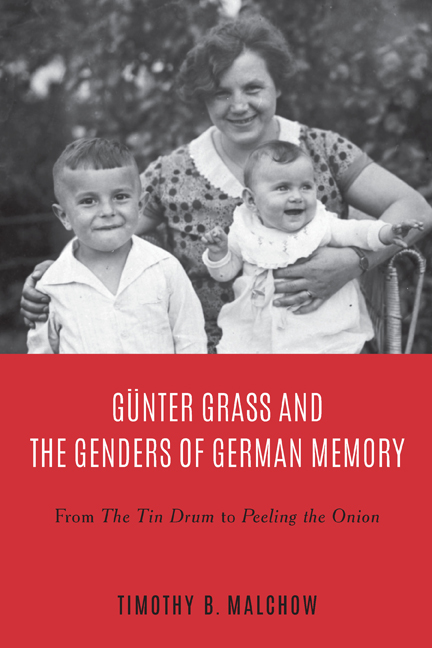Book contents
- Frontmatter
- Dedication
- Contents
- Acknowledgments
- Abbreviations, Translations, and Transcriptions
- Introduction
- 1 Grass’s Biography in Context: 1927–1959
- 2 Corporeal Memory, Trauma, and Art in The Tin Drum
- 3 Bildung, Heimat, and Gendered Modes of German Memory in The Tin Drum
- 4 A Patriarchal Arbiter of German Cultural Memory and His Feminized Others: Leveling Bildung, Opening Heimat, and Championing Art from the 1960s to the New Millennium
- 5 Grass’s Early Life Once Again: Broken Silence, Mourning, and Gendered Approaches to Memory in Peeling the Onion
- Epilogue
- Works Cited
- Index
3 - Bildung, Heimat, and Gendered Modes of German Memory in The Tin Drum
Published online by Cambridge University Press: 09 February 2021
- Frontmatter
- Dedication
- Contents
- Acknowledgments
- Abbreviations, Translations, and Transcriptions
- Introduction
- 1 Grass’s Biography in Context: 1927–1959
- 2 Corporeal Memory, Trauma, and Art in The Tin Drum
- 3 Bildung, Heimat, and Gendered Modes of German Memory in The Tin Drum
- 4 A Patriarchal Arbiter of German Cultural Memory and His Feminized Others: Leveling Bildung, Opening Heimat, and Championing Art from the 1960s to the New Millennium
- 5 Grass’s Early Life Once Again: Broken Silence, Mourning, and Gendered Approaches to Memory in Peeling the Onion
- Epilogue
- Works Cited
- Index
Summary
IN THE TIN DRUM, memories are embodied, and bodies are gendered. To explore the many implications of this basic insight is the focus of this chapter. Here I examine the protagonist Oskar's corporeal memories with an emphasis on his male gender and his heterosexual masculinity. The previous chapter showed that the narrative treats Oskar's corporeal memories, and the underlying trauma they reveal, as potential resistance to the hegemonic public memory of the Adenauer era. Disrupting and transforming how Germans remembered their collective past also affected how they would imagine their national identity. As I suggest in this book's introduction, gender played a significant role in these processes.
As the introduction also shows, the complex, gendered discourses on Bildung (education or formation) and Heimat (homeland) have been part of how Germans have imagined their cultural and national identity going back to the eighteenth century. During the West German Adenauer era, both Bildung and Heimat remained relevant as people attempted to draw on German traditions that could help pave a way forward for the nation, while they also longed for a seemingly more innocent time and tried to cope with wartime losses of many kinds. At this time, when Grass wrote The Tin Drum, the gendered social constructs Bildung and Heimat would have simply appeared as something natural to many readers. Consequently, as a talented male writer, Grass was in a position to use his “male privilege” and appropriate this gendered discourse, with implications both for how readers would view the German nation and for how they would view him. In this chapter, beginning with the relation of male-coded Bildung to Oskar's narrative and then turning to femalecoded Heimat, I will explore how Grass employed both of these constructs in The Tin Drum to influence how Germans would remember and understand their recent past and national identity.
The Tin Drum and the Bildungsroman in the Adenauer Era
With The Tin Drum, Grass intervened in the cultural politics of West Germany, putting himself on the path toward eventually becoming a German icon, a nationally representative author who would be discussed for a time as the “mascot of the republic” and the “conscience of the nation.”
- Type
- Chapter
- Information
- Günter Grass and the Genders of German MemoryFrom The Tin Drum to Peeling the Onion and Beyond, pp. 93 - 120Publisher: Boydell & BrewerPrint publication year: 2021

